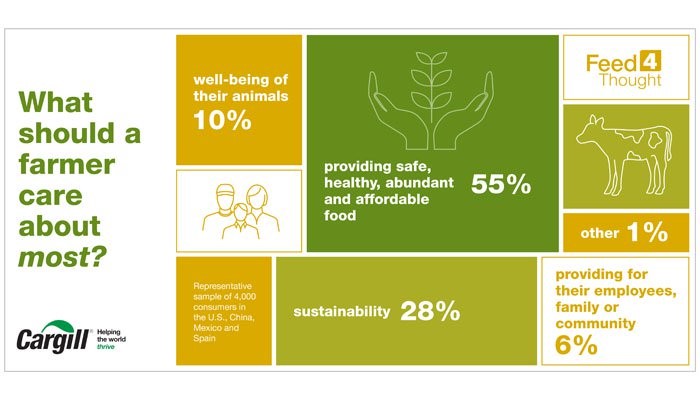
New Research Confirms Farming Is A Tough Row To Hoe
-
55 percent of survey respondents believe farmers should care most about “providing safe, healthy, abundant and affordable food”
-
Respondents prefer their food comes from smaller/specialty, local or organic farms.
-
Farmer stories are essential to expanding understanding among consumers.
Add conflicting consumer expectations to the list of reasons farming is a tough row to hoe. In a recent global study, Cargill found consumers had a hard-to-satisfy wish list for those who put food on our tables.
Most survey respondents said farmers should care most about “providing safe, healthy, abundant and affordable food.” Yet those same respondents would prefer their food come from smaller/specialty, local or organic farms—which can’t necessarily compete on cost, nor match necessary scale.

“Farmers are foundational to feeding the world in a safe, responsible and sustainable way,” said Pilar Cruz, president of Cargill’s feed and nutrition business. “But they do so under significant pressure.”
On one hand, affordable food is central to many families’ budgets. On the other, people question the farming approaches that have made food more available and affordable.
“Cargill is working to raise awareness and foster understanding across the value chain,” Cruz added.
In the latest Feed4Thought survey, Cargill found half the people surveyed in the U.S., China, Mexico and Spain saw a farmer, primarily, as a “person who feeds the world.” But just a quarter chose “steward of the earth’s natural resources” — perhaps reflecting that one-third of contributors doubted the long-term sustainability of today’s agriculture. “Sustainable” was the top word that consumers said they want farmers to be; “efficient” was second.
“Farmers are trying to feed the world and protect the earth’s resources and provide for their families,” Cruz said. “These are not mutually exclusive. Farmers around the world are adopting conservation practices to nourish people, the planet and the health of their businesses.”
Three-quarters of Feed4Thought respondents thought technologically advanced farming was a good thing. But that’s not exactly how they see farmers today. “Technologically savvy” was one of the terms least associated with farmers. Contrast this with the approach of long-term Cargill customer, Coldstream Farms in Washington state, U.S., a dairy operation where innovation helps do everything from reducing feed loss to minimizing lameness to turning manure into drinkable water for cows and chemical-free fertilizer.
“I think the common image of ‘farmer’ remains pitchfork-in-hand, standing in a field,” says Galen Smith, who co-owns Coldstream Farms. “Today’s farmer is far from that. I spend a lot of time researching new technologies, understanding herd trends and finding ways to steer us on a more sustainable course. We’re passionate about nurturing animals and are continually trying to do a better job of educating people on what happens on a dairy farm.”
“We need farmers to tell their stories,” agrees Gabriel Carballal, a Uruguayan member of the Global Farmer Network. “The only impediment to a desirable outcome for all is accurate information about how farming and food production really work.”
Survey findings suggest a need to engage consumers on animal farming in particular. Although there was a 95% positive view of farmers, animal protein producers were viewed less favorably than farmers who grew crops.
“It’s tough to be a farmer,” acknowledges Cruz. “That’s why Cargill anticipates and responds to farmers’ needs in this dynamic marketplace, making them more productive, efficient and sustainable. We’re helping make farming part of the solution to the pressing need to sustainably do more with less across the food and agriculture industry.”
Bringing next-generation flock-management capabilities to poultry producers with new, artificial intelligence (AI) driven service.
Leveraging more than a decade of research on the gut microbiome, Galleon accesses Cargill’s extensive research data to guide flock-management decisions.
From Partnership Comes Prosperity
A Vietnamese farmer partnered with Cargill to improve his farm – and ended up improving his family's well-being.